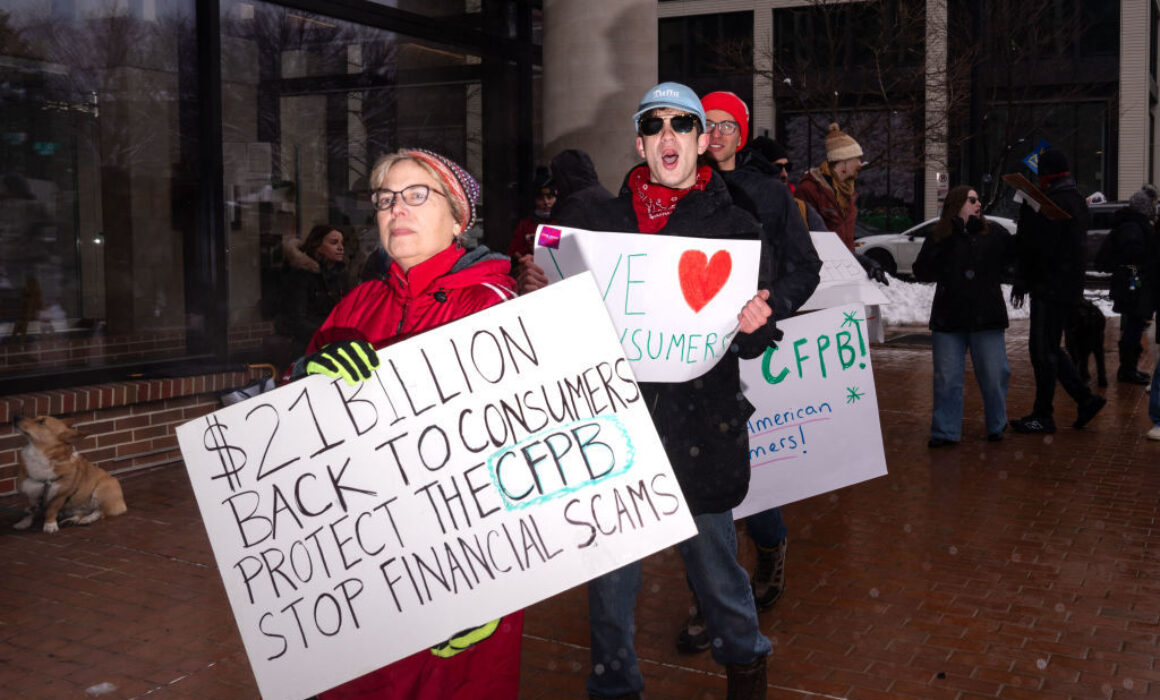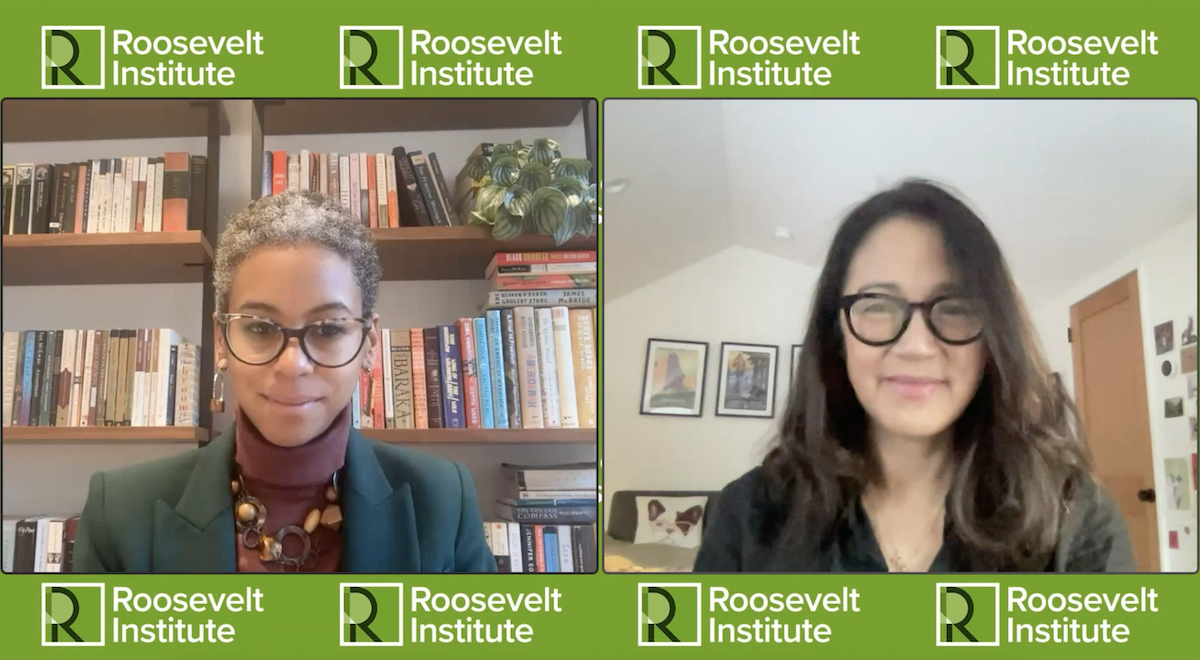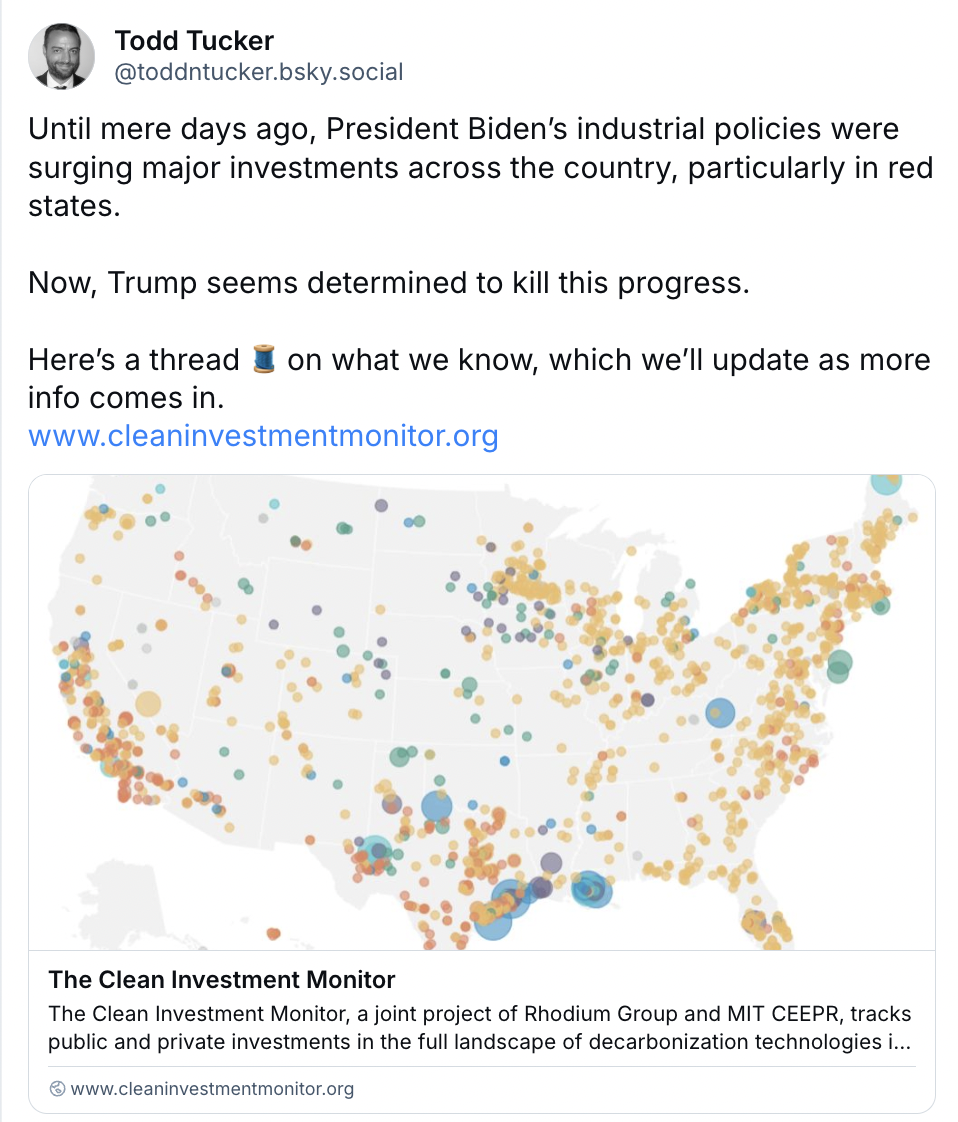Working People Are the Target of the Trump Policy Agenda
February 13, 2025
Attacks on agencies leave consumers vulnerable to corporate exploitation.
The Roosevelt Rundown features our top stories of the week.

Protestors gather outside the Consumer Financial Protection Bureau on February 12, 2025. (Kent Nishimura/Getty Images)
Corporate Wins, Public Losses
The Trump administration’s attacks on the government continued this week with cuts to the Department of Education (DOE) and Consumer Financial Protection Bureau (CFPB). Roosevelt’s new president and CEO Elizabeth Wilkins joined The New Republic for a panel discussion about the new administration’s plans for government: “Are working families in the center of these policies, or are they . . . the victims of these policies?” As Elon Musk marches on with reckless agency overhauls that favor corporate power over worker well-being, Wilkins noted, “I think we will see, more and more, a drumbeat of a very particular answer to that question.”
In a new blog post, Roosevelt’s Emily DiVito describes how this week’s joint blow to DOE and CFPB signals a return to “an era of unbridled financial conning” and sidelines consumers in favor of financial scammers—including the “abusive and extractive for-profit colleges that these agencies have spent years working to rein in.”
Targeting the DOE is “about reopening the $1.6 trillion student debt market to profiteers,” DiVito writes, “not optimizing our education system.” Abandoning education and consumer protection initiatives leaves Americans vulnerable: “Without federal institutions that can monitor, regulate, and intervene in private industry,” DiVito writes, “those industries can and will take advantage of individuals and families—and those affected will have nowhere to go to seek relief.”
The administration is dismantling state capacity to grab power on behalf of already bloated corporations. “In the Muskian worldview, a business tricking you out of your money is efficient, while the government trying to stop it is not,” writes Roosevelt’s Bilal Baydoun. “All of these attacks converge on a single goal: to clear the remaining structures of democracy so that oligarchs like Musk can run freely.”
These actions have started to cause fears of financial instability. “I’ve been a little bit surprised that markets aren’t a little bit more concerned,” Roosevelt Fellow Graham Steele told Yahoo! Finance, explaining that thoughtless funding cuts could “break things totally unintentionally.” On the CFPB’s closure, Steele told The Hill that “the idea of trying to basically shut the agency down in all but name is . . . an escalation.”
The administration’s vague gestures at supporting workers—as they might frame their high-profile tariff agenda—aren’t actually about protecting workers’ livelihoods, and fall apart in the context of their pro-corporate policy agenda. “There are good ideas about how to use tariffs and trade to further labor interests,” says Roosevelt’s Todd N. Tucker, “but they’re coming from workers’ organizations themselves—not the administration’s allies on Wall Street.”

Elizabeth Wilkins Is Ready for the Fight
“I am not alone in this new job, but also we are not alone in this movement to create a more progressive, more capacious, more integrated, and inclusive future.”
This week, Roosevelt’s new president and CEO Elizabeth Wilkins spoke with outgoing CEO Felicia Wong about her experience combating corporate power with Lina Khan at the Federal Trade Commission, what she learned as an organizer early in her career, and how Franklin and Eleanor Roosevelt’s legacy inspires her to address overwhelming challenges with experimentation and urgency.
“People often are worried about the risk of overreach in the kinds of government actions that protect people,” Wilkins says. “And what I always thought was there’s a really understated risk of underreach, of doing so little that people can’t see that government is fighting for them. So how do we build a vision where government is visible and fighting for them? What should it do, and who should be in there doing it?”
Read more about Wilkins’s vision in the full interview.
A Climate Syllabus for Central Bankers
“The administration and the Federal Reserve would have us believe there are no effects of additional fossil fuel production on the price of food, housing and insurance, and that there is no effect of climate-disrupted production and distribution on inflation,” former Deputy Secretary of the Treasury and Roosevelt Senior Fellow Sarah Bloom Raskin told Central Banking this week.
The climate crisis is already having significant impacts on the economy. Yet in recent months, instead of incorporating climate science into its analysis, the Federal Reserve has been dropping out of its climate-related commitments.
So, the Roosevelt Institute is helping them out in a new Substack authored by Sarah Bloom Raskin and Roosevelt Director of Climate Policy Kristina Karlsson. Each month, Fed Lit will cover a research article bridging the worlds of climate science and central banking. “Studying and mitigating climate-driven risks to the economy” is “well within the Fed’s mandate to control inflation and manage financial instability,” argue Raskin and Karlsson.
Join the conversation and subscribe ahead of the newsletter’s first edition.
What We’re Reading
- “The Federal Reserve’s strategy is failing,” writes Roosevelt’s Alí R. Bustamante in Barron’s this week, explaining how housing costs have overwhelmingly driven recent inflation—which the Fed’s policies alone can’t fix. “Without federal intervention to push local and state governments toward pro-supply policies, Americans will remain stuck with high housing costs, high interest rates, and a sluggish economy.”
- In light of news that President Trump may seek a new deal to allow Nippon Steel to invest in US Steel, Roosevelt’s Todd N. Tucker tells Semafor that the Biden administration was right to block the proposed takeover: “Congress ordered presidents to consider ‘security risks’ under the Defense Production Act—which is less about imminent military threats, and more about the long-term maintenance of domestic capacities in strategic industries like steel.”
- The Supreme Court’s 2022 decision to overturn Roe v. Wade has, as expected, caused legal chaos and confusion. “Letting states create their own abortion policies when there’s such division among the states—and their state legislatures—about permitting or restricting abortion creates this tension,” Roosevelt Fellow Rachel Rebouché tells CNN.
